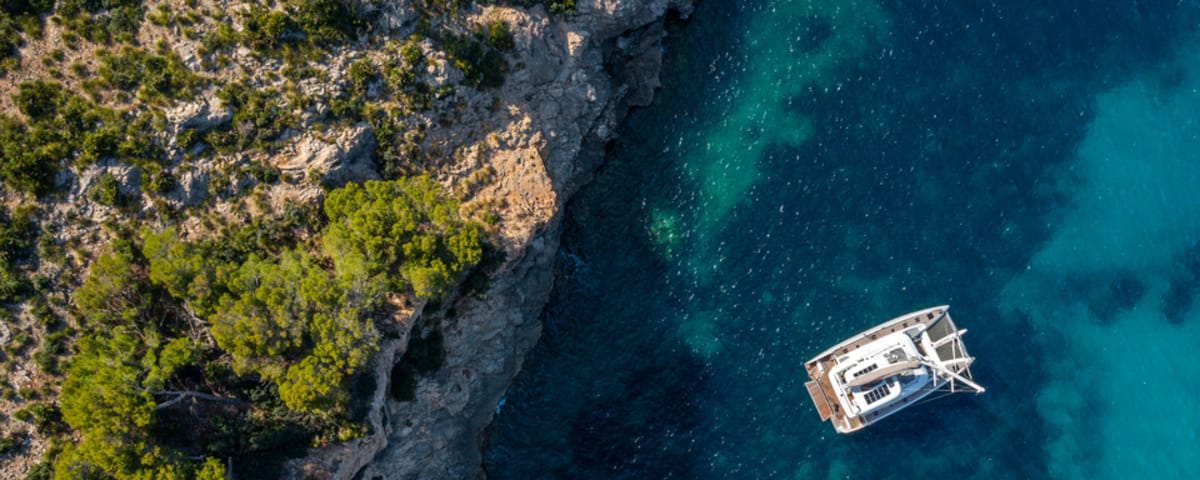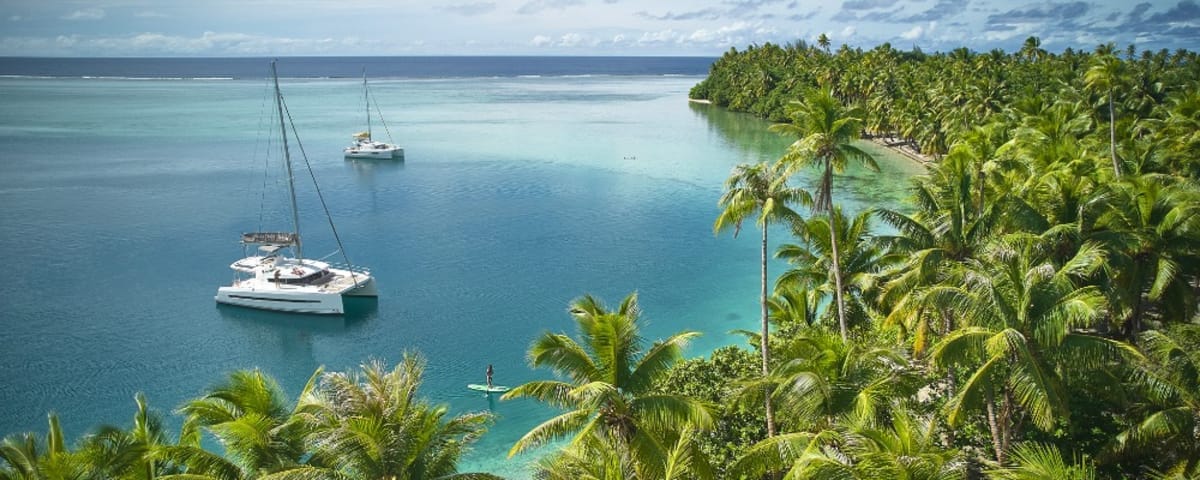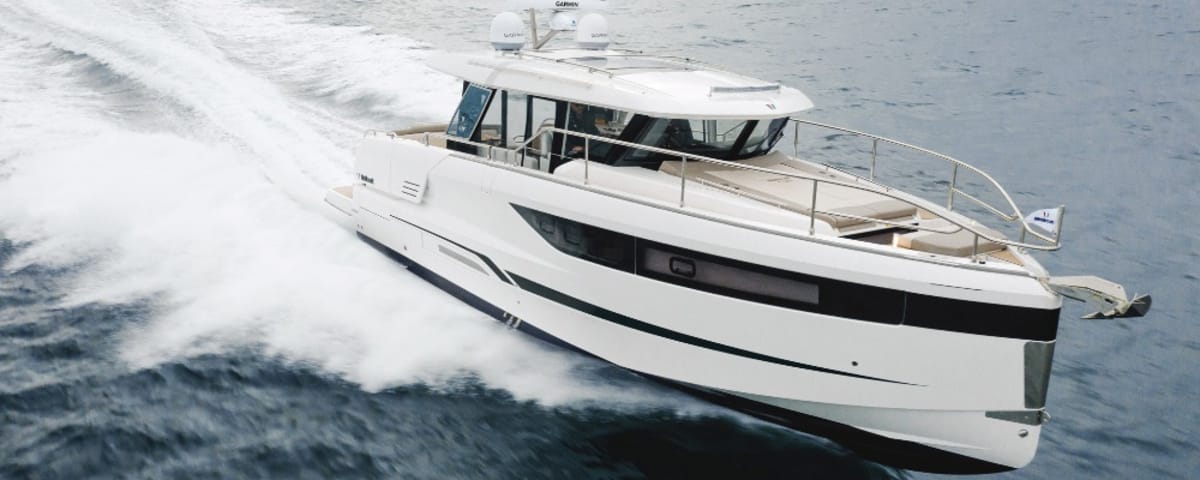Beneteau Group Charts a Course for the Future of Boating: Innovation Driven by Customer Experience and Sustainability
For over 140 years, the Beneteau Group has been a dominant force in the global nautical landscape. Today, as connectivity, ergonomics, and digital technologies reshape the expectations of boaters, the French company is placing customer experience at the heart of its innovation strategy. Design, modularity, smart technology, and personalized support are converging to achieve a single goal: to offer a more intuitive, comfortable, and emotionally engaging navigation experience, without compromising performance.
Redefining Performance Through Comfort
While speed and maneuverability have long been key purchasing criteria, today’s boating experience is evolving. Buying a boat is now about embracing a lifestyle, a way of living on the sea. Like choosing a second home, boaters seek to create a warm, spacious, and peaceful haven that connects them directly with the environment. The Beneteau Group understands this perfectly, and each of its new models embodies this major shift.
Consider the Oceanis Yacht 60, a flagship of the Beneteau range. This nearly 19-meter sailboat, designed by Roberto Biscontini and Lorenzo Argento, stands out as a true floating villa, both elegant and ultra-functional. The open cockpit, fluid circulation, naturally lit interiors, and highly customizable layouts offer unprecedented comfort for this class of boat. Yet, no compromises have been made in terms of hull design or stability: this boat remains a seaworthy vessel, ready for the open ocean.
The same holds true for the Lagoon 60, a next-generation catamaran designed as a loft on the water. With its panoramic flybridge, oversized openings, and modular layouts, everything is designed to live in harmony with the rhythm of stopovers, in constant connection with nature. But beneath this hedonistic exterior lies a robust and seaworthy multihull, designed to cover miles in complete safety.
In a sportier vein, the Excess 11 catamaran appeals to a younger clientele, who enjoy an active sailing style but also desire modern comfort. With its twin helm stations at the stern, it preserves the feel of direct steering while offering exceptional living space for a catamaran of this size. The cabins are spacious, light is abundant, and the cockpit is designed as a true reception area.
Seanapps: A New Level of Onboard Intelligence
This quest for seamlessness extends to technology. With Seanapps, the group has taken a leap forward in onboard connectivity. This application, now deployed on over 10,000 vessels, allows boaters to monitor their boat remotely: battery levels, GPS position, interior humidity, status of technical equipment – everything is accessible from a smartphone. But Seanapps goes beyond simple telemetry. It centralizes maintenance history, sends alerts in case of problems, and facilitates appointment scheduling with dealers. It’s a true intelligent logbook, designed to streamline the lives of owners and simplify maintenance. In a sector where peace of mind is a luxury, Seanapps becomes a key driver of comfort.
A Customer Journey Designed for All Boaters
For all Beneteau Group brands, the customer experience begins long before launch. The customer journey has been completely redesigned to offer a tailored, personalized relationship, regardless of the size of the boat. This is one of the group’s great strengths: offering all boaters, from first-time buyers to experienced owners, the same quality of support, enhanced by premium personalization services.
The online configurator now allows customers to customize their future boat in detail, down to the smallest elements. This applies to both high-end units and more accessible models, such as the Beneteau Flyer 9 SUNdeck, a fast powerboat designed for coastal cruising, or the Beneteau First 36, a sailboat with dual racing-cruising capabilities. Wood, upholstery, electronics, engine – each boater can create a boat that reflects their personal style.
This promise of a seamless and personalized experience also applies to the group’s international brands, such as Four Winns, a historic American shipyard recently relaunched with a bold premium offering. Its latest model, the TH36, is a perfect example: an innovative catamaran day-boat, a cross between a sport-cruiser and a floating lounge, combining sleek design, an ultra-functional deck plan, refined cabins, and high-end finishes. Here again, the level of customization is high, within a distinctive aesthetic universe designed to appeal to a new generation of North American and European boaters seeking a versatile, elegant, and easy-to-live-with leisure boat.
“Our mission, ‘Bringing Dreams to Water,’ embodies our ambition: to provide a solution for all boating dreams, for all generations, for owners and renters alike, and everywhere in the world,” says Gianguido Girotti, Deputy CEO of the Beneteau Group and CEO of the Boat Division. “It’s about accelerating both our entry-level offerings, to make boating more accessible, and our high-end offerings, to meet the expectations of customers seeking premium boats and services. We are convinced that meeting these two expectations is essential to reach a wider audience and support the evolution of nautical practices.”
The Evolving Needs of Boaters: An Interview with Damien Jacob, Sailing Marketing Director
Damien Jacob, Sailing Marketing Director of the Beneteau Group, shares his insights on the changing landscape of boating:
“Boaters’ desires have evolved over the past 30 years, with a greater emphasis on comfort. This goes hand in hand with the evolution of needs at home or in the car, whether it’s autonomy, home automation, or comfort. This need for comfort, even on small boats, is not the only demand: ease of handling is also becoming increasingly important.”
Jacob also notes the influence of the charter market on boat design, as it reflects the growing desire for comfortable and well-equipped boats. He emphasizes that while the needs of boaters have evolved, so has their profile.
“30 years ago, when you saw a group of friends on a boat, they all knew how to sail and they were on board for that purpose. Now, they are users who will mainly stay at anchor, with the children jumping into the water all afternoon, and who will sail for a short time during the day to move from one place to another. Sailing itself is no longer the very center of the boat’s use. It is used as a living platform on the water.”
Looking ahead, Jacob envisions a more responsible boating experience, with a focus on renewable energy, silence, and comfort.
Toward Sustainable and Intelligent Boating: The Beneteau Group, a Pioneer in a New Relationship with the Sea
As ecological transition becomes imperative for all industrial sectors, the Beneteau Group is not simply adapting its processes: it is choosing to fundamentally rethink its contribution to the maritime economy. More than just reducing its footprint, it is undertaking a complete reinterpretation of contemporary boating. A boating experience no longer based on accumulation or power, but on simplicity, fluidity, and a connection to the living world. A boating experience that, far from sacrificing pleasure, redeploys it in a more sustainable and refined form. This approach is embodied in a conviction held at the highest levels of the group.
“Sustainable innovation is truly impactful when it meets a concrete expectation or directly improves the experience of our customers,” affirms Bruno Thivoyon, CEO of the Beneteau Group.
Active Sobriety: Sailing Better, Not Less
The Delphia brand, a pioneer in electric river and coastal navigation, is a prime example of this philosophy. With its range of 100% electric boats, now comprising three models (Delphia 10, 11, and 12), the group offers a realistic and desirable alternative to internal combustion engines. Silence, zero emissions, and no vibration all contribute to a peaceful experience focused on nature and slow travel.
This approach goes beyond technology. It reflects a clear vision: that of “Mindful Cruising.” Slowing down the pace, choosing more secluded itineraries, rediscovering the pleasure of the journey rather than just the destination – all these elements redefine the relationship with the sea and waterways.
In this context, sustainability is no longer a technical constraint or a marketing argument: it becomes a driver of innovation and differentiation, capable of meeting the emerging expectations of an audience seeking meaning, autonomy, and simplicity.
Rethinking Materials: The Challenge of Recyclability
Currently, approximately 70% of the materials used in Beneteau Group boats are recyclable. But the ambition is even greater: to move toward 100% through the adoption of new composites such as Elium® resin. Developed by Arkema, this innovative thermoplastic resin allows the separation and recycling of glass fiber and matrix. It is now used in series on models such as the Sun Fast 30 One Design, the Beneteau Oceanis Yacht 60, and the Jeanneau Yacht 60. In parallel, the Beneteau Group has joined an industrial consortium to implement a complete circular process around Elium resin, including the recovery of production waste, easy disassembly, and reuse. This is a strong promise for the future of the nautical industry.
Giving a Second Life to the Open Sea: The Lagoon 620 NEO Project
With the Lagoon 620 NEO project, the Beneteau Group is venturing into a field that is still marginal in the nautical industry: high-end reconditioning. Faced with the planned obsolescence that affects more and more units that are structurally sound, Lagoon offers a unique alternative: extending the life of its large catamarans through a complete reconditioning, orchestrated by the shipyard itself. These units are taken back, audited, disassembled, upgraded, and re-equipped according to the latest standards – both in terms of comfort and onboard technologies – and then resold with a manufacturer’s warranty and full traceability.
More than just a cosmetic renovation, the Lagoon 620 NEO embodies a circular vision of boating. A second life designed as a new beginning, in line with modern requirements for simplicity, energy efficiency, and connectivity. This approach not only leverages existing industrial capital but also meets a strong market expectation: that of more responsible boating, where buying a boat does not necessarily imply new production.
The Island Cruising Concept: Space, Silence, and Redefined Energy
Among the shipyard’s flagship projects, the Island Cruising Concept occupies a special place. This prospective monomaran, halfway between a catamaran and an offshore dayboat, embodies a new way of thinking about boating: slower, more sensory, and more aligned with contemporary aspirations. Designed as a “floating poolhouse,” it does not seek to break speed records but to create a living space in harmony with the marine environment, centered on well-being, simplicity, and autonomy.
This concept is based on an innovative architecture: a widened single hull, an open and modular deck, open interior volumes, and fluid circulation between relaxation, contemplation, and swimming areas. The hybrid engine, solar panels perfectly integrated into the design, intelligent energy flow management, and optimized hull reduce fuel consumption by up to 50% without compromising comfort or reliability. But the challenge goes beyond environmental performance. This boat is also an experience in itself, a response to emerging new uses: extended anchorages, meditative stopovers, contemplative sailing, and stays in rhythm with light and silence.
“Boating is dependent on its direct environment, the marine ecosystem,” says Gianguido Girotti, Deputy CEO of the Beneteau Group and CEO of the Boat Division. “The natural environment in which boaters operate is constantly changing, and its sustainability is the guarantee of the continuation of nautical activities. Boaters will only stop dreaming of sailing the world’s oceans if this marine environment is preserved. During navigation, Beneteau Group boats must therefore strive to have a minimal impact on these fragile and essential environments.”
Insights from Erwan Faoucher, Director of Professions, Innovation, and Sustainability at the Beneteau Group
Erwan Faoucher shares his perspective on the group’s sustainability efforts:
“We are seeking to reduce the environmental impact of our boats. This cannot be done without taking into account the user experience. We must therefore find the right balance.”
Faoucher discusses the group’s choice of Elium® recyclable resin, the innovative Lagoon 620 NEO reconditioning project, and the development of the Island Cruising Concept, highlighting the importance of reducing environmental impact while enhancing the boating experience.
“I think we are going to move towards more responsible navigation, at least more controlled. I think our customers will seek to navigate in harmony with the environment and with their own values. Today’s innovations will become tomorrow’s commodities. New generations are increasingly thirsty for freedom, the desire for a more immediate experience. Democratizing boating will be essential.”
Democratizing the Sea: Boating for All
Long perceived as a leisure activity reserved for an elite, boating is undergoing a transformation. Changing uses, the rise of the sharing economy… The Beneteau Group understands this well: for the sea to remain a space of freedom, it must be more accessible, more inclusive, and more customizable – without sacrificing safety, design, or the pleasure of sailing.
Reinventing Accessibility in Boating
Accessibility begins with the offering itself. In recent years, the Beneteau Group has strengthened its positioning in the entry-level segment with compact units designed to appeal to a wider audience: young professionals, families, and occasional boaters.
The all-new Beneteau First 30 embodies this ambition. Offered at an accessible price point, this compact sailboat makes no compromises: ergonomic deck plan, assertive design, optimized safety, and solid marine performance. It is aimed at first-time buyers who want to discover sailing on a serious, rewarding platform without breaking the bank. The same logic applies to multihulls with the Lagoon 38, which enriches the entry-level range of the catamaran brand. More compact, more economical to maintain, and easier to handle, it opens the doors of the catamaran to a new audience that, until now, did not dare to take the plunge.
For nearly 30 years, the Beneteau Group has offered flexible financing solutions through SGB Finance, a credit institution owned by the Beneteau Group and Société Générale group. Classic loans, leasing, and LOA formulas allow customers to spread the investment and make boating economically accessible. This strategy also relies on a policy of simplifying options: intelligent packages, modular configuration, and standardized equipment without sacrificing the essentials. Pleasure remains at the heart of the experience, but with controlled costs.
One of the major drivers of democratization lies in the emergence of alternative ownership models with Boat Clubs. The Beneteau Group is fully committed to this evolution. With Wiziboat, its on-demand navigation subscription, the group offers a new approach to boating: no maintenance, no marina fees to manage, just the essentials – sailing when you want, where you want. Present in numerous bases in Europe, Wiziboat meets the expectations of occasional boaters, mobile urban dwellers, and first-time sailors who want to test the experience before perhaps investing in the future. In the United States, the group is already firmly established with Your Boat Club and is now strengthening its offering in Europe through strategic partnerships, such as Le Boat, the European leader in river cruising.
The boating of tomorrow is no longer limited to performance or the sole dream of escape. It is now written at the intersection of three major requirements: attention to the user, environmental responsibility, and openness to new audiences. On these three fronts, the Beneteau Group is undertaking a profound transformation, both industrial, cultural, and societal. By rethinking the way it designs, uses, and transmits its boats, the French company is not simply anticipating trends: it is redefining the very role of boating in our relationship with the sea. A sea that must no longer be a privilege but a shared, conscious, and sustainable space of freedom.
Enjoyed this post by Thibault Helle? Subscribe for more insights and updates straight from the source.


